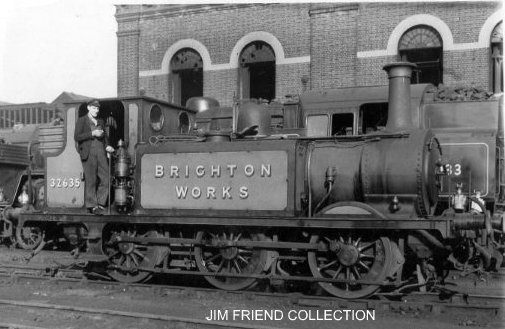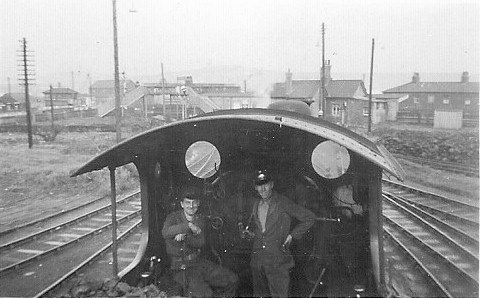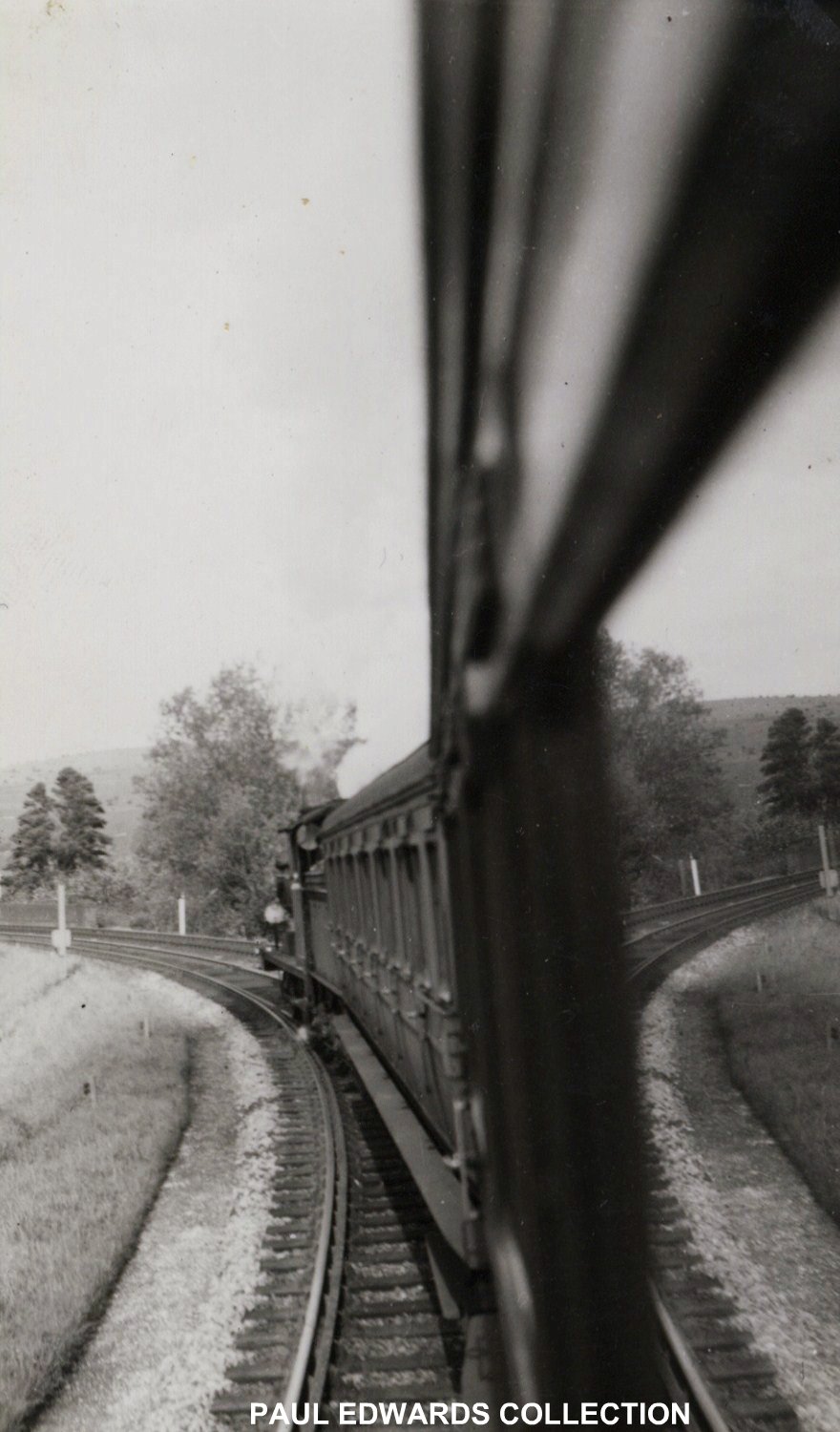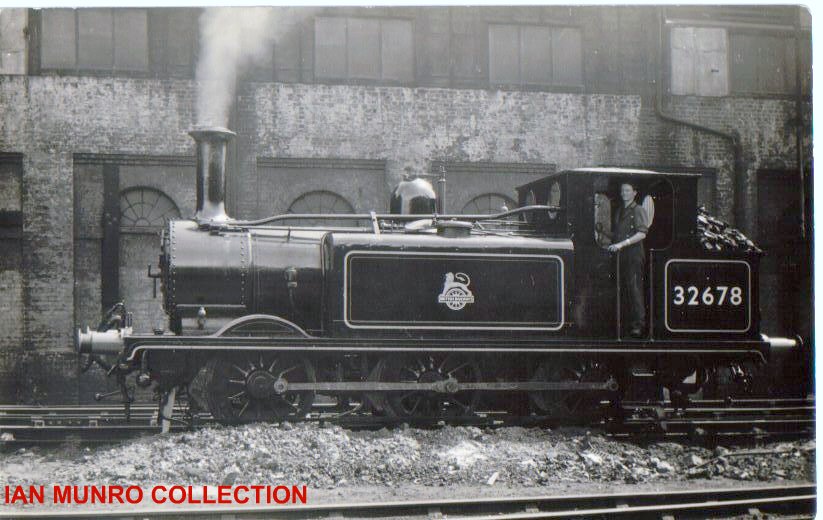

BRIGHTON ENGINEMEN JIM FRIEND
Jim Friend on the "Brighton Works" engine, a Brighton Terrier Class A1x in Brighton Loco
Jim Friend started at Brighton Loco on 16th January 1956 as a Engine Cleaner and
progressing to, Fireman and Past Fireman, in1963 Jim transferred to Slades Green EMUT
Depot to gain his promotion to Driver. In 1965 Jim transferred to Charing Cross where
remained until 20th April 1985, when Jim emigrated to Adelaide, South Australia where he
now resides.
LOCOMOTIVE JOURNAL
BATTERSEA
1956
PAGE 103
This being the first report of the New Year, I would this opportunity of sending greetings to all of our brothers in the Society. Much has been achieved during the past few months for members wages and conditions, and this should make clear to the younger members the advantages of being solid in the ranks. To all members of Battersea - don’t forget to keep your card clear; and to the few “NON”, what about supporting the Society that represent the footplate by joining us?
I am very pleased to report that the L.D.C. at our depot is all A.S.L.E.&F., and it is up to the members to give them every support.
The annual Children’s Party took place on January 21 at the Brunswick House Club, and was a great success. Each child was given a parcel of sweets, fruit, chocolate and a new shilling. Entertainment was supplied by members of the fitting staff and footplatemen and by a professional artist. It was a great pleasure that we welcome Bro. A. Hallworth and his wife to this function. Bro. Halworth spoke for a few moments during the interval.
R. WEEKS
BRANCH SECRETARY
LOCOMOTIVE JOURNAL
BRIGHTON (2)
1956
On November 12 a very successful Social Evening was held at the Richmond Hotel, where
Bros. C. Cole, A. Routledge*^, W. Hudson and A.T. Green* were presented with a gift from the Retirement Fund. Organiser W. Cleaver made the presentations with appropriate words.
Let us keep the good work of this fund going. At our December meeting all officers were re-
elected for 1956. The present L.D.C. were adopted as the official nominees for 1956. The
January meeting was enlivened by the attendance of Bro. Monty Renshaw (A.A. Delegate), who gave a splendid report on Conference, touching especially on items affecting motormen and dual men. Several questions were asked and very ably replied to and there was no doubt left in our minds that the grade of motormen is being brought to the surface to our constitution, and with the coming of increased electrification over a wider area the
maintaining of the position of motorman will have to be seriously considered. So fill the
Branch Room, lads, and let our E.C. know that we are very much alive to those who matters
that will assist the front end of the future – “the motorman.”
F.W. MUSK
BRANCH CHAIRMAN
* Original Brighton No. 2 Branch Member
^ West Worthing Motorman

Ron Terrill Collection
Newhaven Firemen Johnny White & Brian Simpson
On the footplate of a 'H2' Class Atlantic in Newhaven Loco c1955
LOCOMOTIVE JOURNAL
FEBRUARY 1956
ON THE SURFACE
A PAGE FOR MOTORMEN
By D.K. PULLEN
Page 38
Unfortunately these notes must go to press before the new E.C. members have had a real
opportunity to take full stock of their new surroundings. At the time of writing we are both
very much in the “settling-in”stage, though we already seen enough to be quite sure there is
plenty or work ahead.
Election of officers, financial matters, minutes and memoranda of top-level meetings,
unresolved L.D.C. and Sectional Council problems, educational facilities for members, Irish
affairs, political matters - these are the main headings under which are grouped scores of
items vital to our membership. Periodically I hope to bring to your notice some brief
information on the more important matters which have received the attention of your
Executive Committee; it will be m aim to get around to as many branches as is humanly
possible during each quarter, not merely to enlarge on these reports but also to seek
information on all our local electrical problems. Only with the fullest co-operation
between L.D.C., Sectional Council and E.C. Representatives can we hope to make headway in our struggles for improved conditions and adequate payment for our labours. Make sure that YOUR branch keeps on top of the many problems which the “Modernisation Plan” will
create: ATTEND THE BRANCH REGULARLY IN ORDER TO ENSURE THAT YOUR
REPRESENTATIVES ARE KEPT ON THEIR TOES.
Recent correspondence from some of our younger Motormen members brings more
complaints against the Promotion Scheme, particularly with regard to transfers under Clause
23(c) of the P. T. & R. arrangements. No space here to consider the merits of all the
arguments, but everyone should remember that unless the whole promotional arrangements
undergo a complete and radical change, there will always be someone with a grouse. The
Society’s policy of “First in, First out” of Dual links will go far, if approved by the other
parties concerned, to resolve the main complaints of the Dual Link Driver. Yet it must be
admitted that the consequent emergence of young Drivers from the Dual Links on Second
Preference moves could, in many cases, completely “freeze” the Accommodation Move men for a long time - regardless of the seniority of the latter. Our Southern Electrical Delegate to the 1955 Annual Assembly of Delegates, a Sectional Council representative well versed in all the complexities of the scheme, made a valiant but unsuccessful effort to bring about a change in policy. Whatever your personal feelings on the matter it must be recognised that the vast majority of our fraternity has gone on record AGAINST any alteration in the Accommodation Move. We can discuss the outcome of Conference decisions on this important matter after Monty Renshaw’s A.A.D. Report to the Branches.
Which reminds me that attention should now be focussed on the forthcoming A.A.D. Bert
Shingleton (Slade Green) will be our delegate and all Electrical Branches should now be
thinking of arranging for Bert to come along to discuss the Agenda items which will be
published shortly.
Despite all the “beefs” of the habitual Gripers, there is now a far greater degree of real unity
among Southern Motormen than ever before. The solid stand taken in December last on the
subject of Christmas Leave arrangements proves the point; had it not been for the joint
approach made by our L.D.C. and Depot Representatives in December, far fewer men would
have enjoyed their day off at Christmas.
The main credit for this improvement in our local bargaining power must go to the Joint
Electrical Branches’ Committee.Chairman Arthur Dean (Wimbledon) and his team are to be congratulated on the work of the past 12 months; thanks are due to our Sectional Council Representatives for their all-important reports to the Committee - with a special “Thank you” to Ernie Channing for his continued interested in our affairs. The E.C. Members, too, have played their part by keeping us on the “straight and narrow” whenever over-enthusiasm has threatened the constitutional position. Special mention should be made here of the invaluable services of the L.T.E. Member, Bert Howes, who can always be relied upon to add life and spice to any meeting with his breezy reports of top level activity. 1955 was a difficult year for our fraternity but, during that sternest test of all in May - June last, our Southern Motormen members proved conclusively that they will stand resolutely united in any emergency. Ley no one be guilty during 1956 of any action which might threaten this unity - rather let us do everything we can to foster even better associations at all levels, regardless of depot, district, section or branch.
There have been a number of changes of branch officers this year and some alterations in
time and place of meetings. It is to be hoped that new officers are settling down satisfactory
and that the fresh surroundings have brought the desired increase in attendances. Motormen’s branches are among the best attended and most active in the country, though there is, of course, plenty of room for improvement even with us. Selhurst has for many years held four meeting per month with monthly attendance of 60-80. Now there will be only two meetings monthly and it is hoped that the attendance figure will be maintained. Secretary Bill Boulton is now in his 24th and FINAL year of office in this capacity, and every member is expected to make a real effort throughout 1956 to attend all branch meetings as an expression of appreciation of the great work put in by Bro. Boulton during his long Secretaryship. Later I hope to be able to report to you some of the more important matters discussed during my first session on the Executive Committee.

Bob Walls Collection
T.W.W. Fireman Unknown & Driver Vic Rumley
LOCOMOTIVE JOURNAL
MARCH 1956
PAGE 286
NORWOOD BRANCH
M.I.C. good Branch Meetings fair; very necessary now for all to attend the meetings owing to the effects of this MODERNISATION on us. Pleased to see Bill Boulton still doing his stuff, Grand chap, Bill - tried and very much proved. The 1956 A.A.D. has gone; serious decisions were made. I have no doubt about the way they dealt with the General Secretary and the E.C. It is up yo us to give our support to make them a success. Why ask us yo work our Rest Days on Saturdays and Mondays (which we refused)? We have not enough work to employ all our men on these days now, so we can say we have saved them money be refusing! We have a job as a Fireman for Terence Feeley of the Sunday Graphic, and then he can get a Free Pass, I am sure he would be sure usefully employed than by writing articles such as he wrote on June 24, and we hope he liked our resolution. So long, chaps!
P.K. WILLSHAW
BRANCH REPORTER
LOCOMOTIVE JOURNAL
JULY 1956
ON THE SURFACE
A PAGE FOR MOTORMEN
By D.K. PULLEN
Page 236
Most people agree that we live in a tough world. If you happen to be a Local Departmental
Committee representative things are a great deal tougher. When anything goes wrong - when, for example, the management gets sticky about the application of some new agreement - it’s always the fault of the L.D.C. if the matter is not satisfactorily settled before someone is inconvenienced. Take the current controversy on the subject of leave in lieu of Bank Holidays.
Five short months ago we were congratulating ourselves on the outstandingly successful
conclusion of lengthy negotiations with the British Transport commission on the subject of
increased wages, Saturday afternoon enhancements, sick pay, mileage and among other
important items Bank holiday lieu leave.
Since January most of is have been toiling on anticipation of (a) extended annual leave, or (b) an additional week’s holiday at some latter date - both made possible by the accumulation of lieu leave days plus a rest or two. Some, more modesty, planned to take the Saturday before their holiday just to make sure of getting off to an early start and to ensure full value for their money at holiday camps and boarding houses. Unfortunately, stony-hearted Shed Masters had different ideas. Notices have been posted in some areas to the effect that no lieu-leave will be granted until the end of the summer service. The reasons? Staff shortages, of course.
Quite understandably, our men are getting a little tired of this excuse. We have hears it every
summer since the advent of rest days and it’s beginning to wear a bit thin after all these years.
Long ago we were told that the Dual Links would permanently solve the problem of
providing “spares” on the electric side, yet it has been rest day working during the summer
months which has saved the management a lot of headaches. If our District Motive Power
Superintendents had to rely on Dual Links to help them out, the whole staffing position would have been radically amended long ago. Those L.D.C.’s which have recently shown signs of getting tough on the subject of rest day working have been told by the management that no lieu-leave will be granted unless the spare work is covered by the rest day men. In the
Brighton D.M.P.S. area where L.D.C’s have not been approached on the subject of shortages, or of rest day working, the men are expected to accept the managerial decree that no leave whatsoever will be granted until the end of the summer service.
It is easy enough to blame the staff side representative when your application for leave is
refused but this problem is b no means easy solution. We must all remember the wording of
the national agreement “Leave in lieu to be granted on days mutually convenient to the
Management and Staff concerned, due regard being paid to the exigencies of the service.”
L.D.C. representatives will do their utmost to obtain from the management a local agreement which will ensure the fullest accommodation of the wishes of the staff they represent. Some L.D.C.’s will have a tough time. For others the problem is lessened through the operation of a rest day working agreement. ONE THING IS CERTAIN. Unless YOU give your representatives the support they deserve, the management will hold the whip-hand. Now, more than ever before, there is a need for the closest co-operation between all Electrical L.D.C.’s. Just recently the management has successfully split us all from top to bottom on the rest day question. The next meeting of the joint Branches must make sure that our ranks are closed. The Management will then see that we really mean business.

Photo taken Mr. G S Robinson
Leaving Lewes with the 11:30 up East Grinstead L.L.
on the first day of the re-opening of the Bluebell line on the 7th August 1956
Worked by Brighton Enginemen
Driver Charlie Thorpe and Fireman Jimmy Edwards
LOCOMOTIVE JOURNAL
AUGUST 1956
ON THE SURFACE
A PAGE FOR MOTORMEN
By D.K. PULLEN
Page 259
Congratulations to those Local Departmental Committees which have promptly acted against the “decision” of certain Shed Masters to allow no leave in lieu of Bank holiday until the end of summer period. The Electrical L.D.C.’s at Bricklayers’ Arms, Norwood Junction and Brighton certainly lost no time in reminding the managements that such matters are best dealt with in full and frank discussion at L.D.C. level. Result? A hasty withdrawal of the offending notices and a promise that applications for leave will be sympathetic considered.
Will the management never learn? Leave will be granted wherever and whenever possible,
having regard for traffic requirements. This “revised” arrangement is, of course, in line with
the national agreement which says lieu-leave shall be granted on days mutually convenient to management and staff.
Electrical L.D.C.’s at Nine Elms, Stewart’s Lane and else where have found little difficulty in agreeing lieu leave arrangements, chiefly because staff shortages in those areas have been
offset by the working of rest day. First reports of the meeting with D.M.P.S. (Brighton)
indicate that he, too, is thinking in terms of rest day working to cover lieu and special leave
during the summer. Men in that district who have jealously guarded their rest days in the past will not take too kindly to any relaxation of their “No Working” agreement. However, the difficulties of the situation are obvious to everyone. Despite all our efforts to secure real unity in our local approaches to the management, we have to admit failure this year on the rest day question. This is but a temporary set-back; time NOW for joint branch discussion on the staffing position, so that our representatives can decide a plan of action for next year.
Several problems which have engage the attention of Motormen’s representatives at local
level in the recent past have now reached the Executive Committee for further consideration.
Annual Leave Rosters, roster scrutiny, mileage working, clothing issue - these and many other items fall to be dealt with in various stages of the Machinery of Negotiation. Just a word on the subject of “P.N.” Relief. For some while, our L.D.C.’s have argued strongly that any time occupied in walking from the point of relief to the place where facilities are provided for taking meals should be excluded from the 30 minute break. The continuous 30 minute P.N. break was not wrenched from the management without a struggle. Many years ago the old “Pioneer” electric men were forced to strike for a reasonable “Physical Needs” relief period away from the controller. We shall be foolish, indeed, if we now permit the slightest encroachment on this very necessary preserve. The matter has been listed for discussion at the Railway Staff Joint Council - meanwhile, L.D.C.’s should strongly contest any diagrammed duty which fails to provide the full 30 minute break exclusive of any walking time involved.
The 1956 Annual Assembly of Delegates, having effectively dealt with sundry domestic and
industrial matter, certainly left no room for doubt as to where they stood on political affairs.
Aneurin Bevan for the Treasurership of the Labour Party, resolutions on such vital matters as Disarmament and Government Policy in Cyprus, another strongly critical of the present
leadership of the Labour Party. All these items have now received the further consideration of the E.C. - as a result of which, resolutions will be submitted to the Labour Party Conference and Trades Union Congress later this year.

Brighton Driver Ian Munro
Outside the Weighbridge in Brighton Loco.
Ian entered the footplate grades on the 14.08.1950 at Brighton and later transferring to
Brighton E.M.U.T. in the early 1970s. On the 22nd July 1974, Ian eventually transferred to
West Worthing to do a mutual change of depots with West Worthing driver Ted Janes. With
the closure of West Worthing in 1995 transferred to Barnham where he remained until his
retirement.
In July 2011 Ian emigrated to Canada.
LOCOMOTIVE JOURNAL
OCTOBER 1956
ON THE SURFACE
A PAGE FOR MOTORMEN
By D.K. PULLEN
Page 331
Dual Link Driver are having a tough time. Quite apart from the very raw deal that they are
getting, in common with preference and accommodation - move Motormen under the P. T. & R. arrangements, it now appears that the normal protection afforded the “ regular” driver with regard to rostered duties and “ pare” work (R.S.C. Minutes 65 and 514) is being denied them.
When the present arrangements for promotion, transfer and redundancy were first discussed
at the 1949 A.A.D., the President of the E.C. at that time had this to say of the Dual Link
position: “The great difficulty in the past........ has been because men who were considered
dual men had no regular rostered time and were in fact disturbed every alternate day....... But
now that the men in the dual link will have regular rostered hours and a regular job in the link there will be the incentive for them come forward”. It is important to re-read the case for the establishment of dual links within the P T. & R. scheme put forward by your representatives at that conference because it will give a fair idea of the envisaged scheme, and will point clearly to the many pitfalls with which the path of our negotiators has been strewn in the years that followed. The wonder is not so much that anomalies have occurred as that the scheme has worked at all. So far as our policy is concerned no one should complain.
Conferences have accepted that the dual link system should solve the problem of covering
electrical work in the most economical way possible while at the same time giving the
maximum satisfaction and protection to dual Drivers. This would undoubtedly be so today if:
(a) the dual links were always fully operative:
(b) the signing on times of non electrical turns in the dual link were arranged so that R.S.C.
Minute 514 could apply:
(c) it were generally recognised that the first call on dual men is for electric work;
(d) the “spares” in the electric links were restored to the 1950 figure;
(e) the rotes chiefs showed a glimmer of sympathetic appreciation of a man’s social
commitments.
Unfortunately none of these things appear to apply, with the result that most dual men are
being hounded about all over the duty sheet, completely without regard for a home life which, by the very nature of shift work, is already seriously hampered.
The dual man is in the unfortunate positions of having an interest in both forms of traction.
He has the worst of all worlds, and can only live for the day when a vacancy in the electrical
link takes him back to a more normal life once again. It is encouraging to learn that some
electrical L.D.C.’s have taken up the matter of dual link usage with the management, with the object of clearing up some of the points mentioned. The management should be told in no uncertain terms that none of our men are to be treated as though they re continually hanging behind the door waiting to be called to work. We have a social life to live and it is up to our local representatives to resist all attempts to “side step” those agreements which afford the slightest protection.
It seems that many who have been in receipt of the Lodging Allowance are becoming more
and more perturbed at renewed insistence of Shed Masters that “documentary evidence” of
attempts to secure accommodation must be provided by the individual, We all recognise that
an employer who provides an allowance for married staff transferred has a right to some
assurance that efforts are being made to find accommodation. It now seems, however, that
certain Shed Masters are not satisfied with notes from the local authority but are insisting on
evidence from house agents and private landlords who have been approached.
Railway accident on British Railways
Southern Region
Central Division